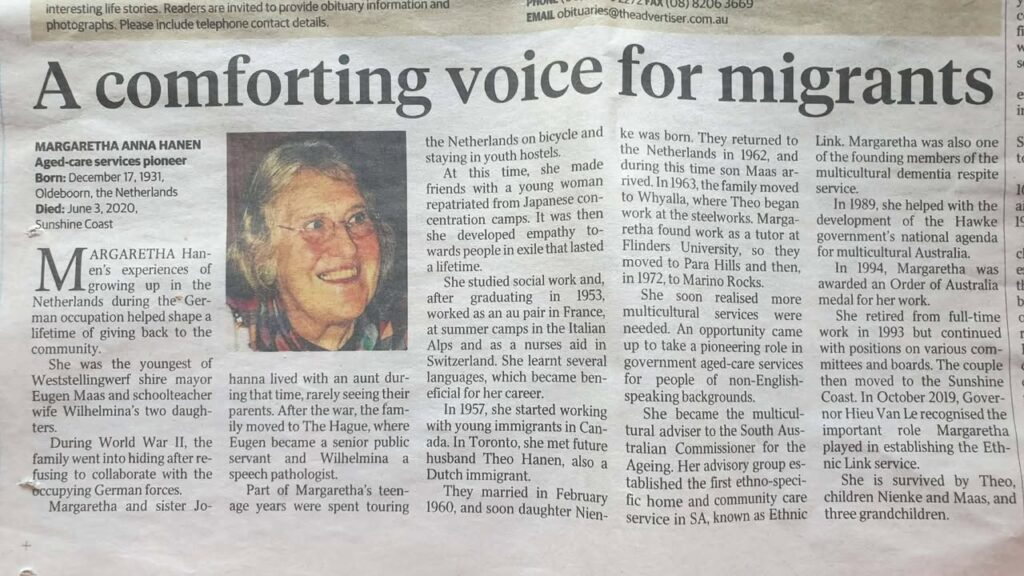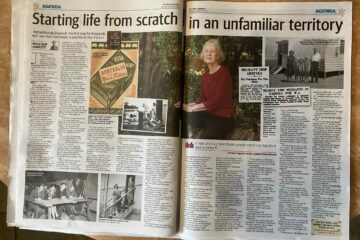Margaretha Hanen OAM (née Maas) was a social worker whose concern about the lack of specialist services available to ageing South Australians from diverse cultural and linguistic backgrounds sparked change in this sector.
Early years in the Netherlands
Margaretha was born in Oldenboorn in the northern Dutch province of Friesland on 17 December 1931 and grew up in the village Wolvega. Her family consisted of her mother Wilhelmina, a schoolteacher, her father Eugen Maas, town mayor, and her older sister Johanna.
When Margaretha was nine years old the Second World War broke out. Late in the war Margeretha’s father, in his role as mayor, refused Nazi German orders to send people from his town to repair railway lines damaged by British bombs. To avoid retaliation by the Nazis Eugen and Wilhelmina went into hiding. During this time their daughters Margaretha and Johanna stayed with an aunt and saw their parents only occasionally.
After the war Margaretha started high school in Steenwijk, a town about 12km away in the next province. After two years the family moved to The Hague where Margaretha finished her high school education. Having finished school she wanted to travel but, as her parents required her to first obtain a qualification, Margaretha chose to study social work. She studied in Rotterdam and worked as a social worker throughout the Netherlands, including in Friesland and Amsterdam.
A Canadian adventure
While studying she managed to squeeze in her love of travel by participating in summer ‘student work camps’ in Italy, and later by taking a job in Canada. Margaretha worked in Winnipeg for two years before moving to a new job at the International Institute of Metropolitan Toronto, which she described as “a community centre for newly-arrived immigrants”.
Here she met Theo, a Dutch migrant who would become her husband. They married in 1960 and had two children. Their daughter Nienke was born in Canada and in 1962 their son Maas was born in the Netherlands, as Margaretha and Theo had decided to return to Europe. However, Theo’s work in the construction industry and differences with family members prompted the couple to emigrate again, this time to Australia.
Life and work in South Australia
Margaretha and her young family migrated to Australia in 1963, settling in Adelaide. She recalled that they chose Adelaide because “we had lived in Toronto which was such a huge metropolis, and we thought we wanted something smaller. We wanted a better climate, not too cold, we wanted – it was attractive to us that, you know, you had hills here and that you also were very near to the sea, so the location seemed good”. The family initially stayed in a migrant hostel before moving to a unit in Glenelg.
In Adelaide Margaretha continued her career as a social worker with the Young Women’s Christian Association (YWCA). The family lived in Adelaide for a while until Theo got a job with mining company BHP, requiring the family to relocate to Whyalla. After a short nine-month stint in Whyalla, however, the family returned to Adelaide where Margaretha began lecturing at the University of Adelaide’s Department of Social Studies (later Flinders University). In an interview decades later she described this period of her life as “a fascinating time”.
After leaving Flinders University in 1980 Margaretha worked at the Queen Victoria Hospital with women who were considering abortions (at the time called terminations). She recalled, “One thing that struck me there [was] that you didn’t get any women from non-English-speaking backgrounds, which I thought was funny because there were a lot of them. We got very, very few.” Over the next decade, this observation would become a key part of Margaretha’s working life.
Department for Community Welfare and the beginnings of Ethnic Link
Margaretha next took a job as Health Social Worker in the Department of Community Welfare in Woodville. In this capacity she began investigating aged care options for people from culturally and linguistically diverse backgrounds, because she had noticed in her previous work that this population group was underrepresented in the aged care sector. As part of her research Margaretha spoke to the many different multicultural communities in Adelaide as well as to government departments, agencies and organisations involved in the aged care sector.
Her efforts resulted in a dialogue between these groups – something that was completely new. She said, “[…] in Woodville I started to write and knock on doors and things like that, and in the end we had a group of volunteers who started to be active in the communities, and people started to know us and started to ’phone me and say, ‘Do you have somebody who speaks Latvian, because I have somebody in hospital who blah, blah, blah,’ right?” This became the foundational premise for an organisation that Margaretha would found in the late 1980s called Ethnic Link. Ethnic Link continues to run today under the name Ethnic Link Services.
In an interview Margaretha explained her interest in helping CALD communities access care. She said, “[…] there was a gap. […] And things like ‘why didn’t they [migrants – DACC] learn English’, or ‘well, they have been here for forty years, so why don’t they adjust?’ I kind of tackled those issues, you see, and I tried to explain why and there are reasons for these things, and that you might not feel that much at home in this country, especially when you have been denigrated when you first came here, that you might have certain resentments and these might become stronger when you’re older again, right? So I tried to raise those issues in what I wrote and what I said at conferences, I suppose, and was pretty forthright about it.”
Government advisor
The changes Margaretha Hanen and her team were making in South Australia did not go unnoticed by the rest of the country. Interest in the approach to social work for multicultural communities rose, and Margaretha became a government advisor on this topic. In 1985 she was announced as the Ethnic Aged Advisor for the South Australian government’s Office of the Commissioner for the Ageing. Two years later, she was appointed to the federal government’s Advisory Council on Multicultural Affairs on the invitation of Prime Minister Bob Hawke. Margaretha was also an expert advisor to the Federation of Ethnic Communities’ Council of Australia and a member of the South Australian Older Women’s Advisory Group, among other committees.
Retirement and recognition
Margaretha Hanen retired in 1993 but remained actively involved in various committees and organisation. In 1994 she received an Order of Australia Award “For service to the provision of aged care programmes for people from non-English speaking backgrounds”. This recognition of her achievements came as a surprise to her, but Margaretha stated that she was proud of the award.
In her later years Margaretha and her husband Theo moved to Queensland’s Sunshine Coast. She passed away there on 3 June 2020.

Selected additional sources:
- Margaretha Hanen, “Core Issues in Planning Services for the Athnic Aged”, Australian Journal on Ageing vol.5 no.4 (November 1986), pp.8-12, DOI: https://doi.org/10.1111/j.1741-6612.1986.tb00296.x
- Media release 09 April 1987, via PM Transcripts
- Margaretha Hanen, ‘Ingezonden’, Dutch Australian Weekly, 24 September 1990, p.13. National Library of Australia via TROVE.
- Commonwealth of Australia Government Gazette, N. S 5, 26 January 1994, p.12
- State Library of South Australia: OH 593/9, Interview with Margaretha Hanen by Pauline Payne, 2 January 2002
- “Vale Margaretha Hanen OAM”, MCCSA Community Voices, Winter 2020, p.14


